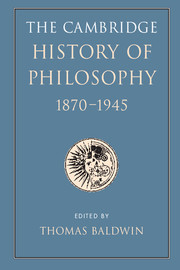Book contents
- Frontmatter
- Contents
- List of contributors
- Introduction
- I 1870–1914
- II 1914–1945
- 8 Logic and philosophy: the analytic programme
- 9 The diversity of philosophy
- 10 Knowledge, language, and the end of metaphysics
- 41 Sensible appearances
- 42 The renaissance of epistemology
- 43 The solipsism debates
- 44 Language
- 45 The end of philosophy as metaphysics
- 11 Philosophy and the exact sciences
- 12 Mind and its place in nature
- 13 Philosophy and social science
- 14 Ethics, religion, and the arts
- 15 Law and politics
- Biobibliographical appendix
- Bibliography
- INDEX
- References
41 - Sensible appearances
from 10 - Knowledge, language, and the end of metaphysics
Published online by Cambridge University Press: 28 March 2008
- Frontmatter
- Contents
- List of contributors
- Introduction
- I 1870–1914
- II 1914–1945
- 8 Logic and philosophy: the analytic programme
- 9 The diversity of philosophy
- 10 Knowledge, language, and the end of metaphysics
- 41 Sensible appearances
- 42 The renaissance of epistemology
- 43 The solipsism debates
- 44 Language
- 45 The end of philosophy as metaphysics
- 11 Philosophy and the exact sciences
- 12 Mind and its place in nature
- 13 Philosophy and social science
- 14 Ethics, religion, and the arts
- 15 Law and politics
- Biobibliographical appendix
- Bibliography
- INDEX
- References
Summary
The problems of perception feature centrally in work within what we now think of as different traditions of philosophy in the early part of the twentieth century, most notably in the sense-datum theories of early analytic philosophy together with the vigorous responses to them over the next forty years, but equally in the discussions of pre-reflective consciousness of the world characteristic of German and French phenomenologists. In the English-speaking world one might mark the beginning of the period with Russell’s The Problems of Philosophy (Russell 1912) and its nemesis in Austin’s Sense and Sensibilia (Austin 1962 – published posthumously, but given originally as lectures at the end of our period in 1947). On the continent, a corresponding route takes us from Husserl’s Logical Investigations (Husserl 1900/1) to Merleau-Ponty’s Phenomenology of Perception (Merleau-Ponty 1945).
While the structure of the problems is recognisably the same in both traditions, over this chapter I elaborate and comment on some of the differences in these treatments. It is easy to feel at home with the alleged attachment to common sense and obvious truths that the analytic tradition from the outset avows. But when one looks at the topic of perception, a concern as central to the development of early analytic philosophy as is the study of logic and analysis of meanings, early analytic theories look strange and idiosyncratic. Much of what the phenomenologists have to say, on the other hand, strikes more of a chord with contemporary English-speaking philosophers than their analytic forebears. But the development of early-twentieth-century discussions shows that the parallels and differences among these thinkers, and the echoes with the way that we now conceive of these problems, are somewhat more elusive than one might expect.
- Type
- Chapter
- Information
- The Cambridge History of Philosophy 1870–1945 , pp. 519 - 532Publisher: Cambridge University PressPrint publication year: 2003
References
- 4
- Cited by



